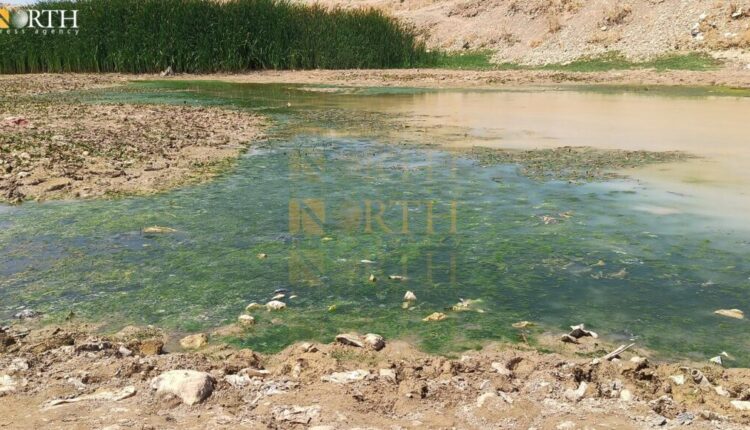
By Hani Salem
AFRIN, Syria (North Press) – “You will find no living branch in Afrin,” remarked Muhammad Bakor, 56, a landowner of an agricultural land residing on the outskirts of the town of Bulbul, within the city of Afrin, northwest Syria. These words vividly express his apprehension arising from Turkey’s continuous diversion of water from the region.
He further lamented, “The Midanki Lake used to be the lifeblood of the local population. However, Turkey and its mercenary Turkish-backed factions [aka the Syrian National Army (SNA)] have prioritized supplying water to the people of the Turkish city of Reyhanli, while deeming us unworthy of our water.”
Afrin has been under the occupation of Turkey and the SNA factions since 2018 following a military operation dubbed “Olive Branch” against the Kurdish People’s Protection Units (YPG) under the pretext of preserving Turkey’s national security.
The operation caused the displacement of about 300,000 of the original inhabitants of the Kurds of Afrin who have been taking shelter in 42 villages and five camps in Aleppo northern countryside, locally known as Shahba region, since then.
The farmer continued, “Previously, I could cultivate my land three times per year, benefiting from the abundant water in the Midanki Lake. However, due to the scarcity of rainfall and the extraction of water from the lake, our monthly water allocation has been reduced to three irrigations. This limitation severely constrains our choices regarding crop types and the area that can be irrigated, consequently diminishing the availability of green spaces and compromising the quality of our agricultural produce.”
“The animosity of Turkey towards Afrin will eradicate any remaining signs of vitality, let alone the repeated assurances from the local council of Bulbul to address the water scarcity issue in the region. However, these promises have been nothing but empty words for the past two years, lacking any tangible action. I believe that selling my land and departing from Syria is the only viable solution for me.” he further added.
Since late 2020, Turkey has been diverting water from Midanki Lake, which irrigates 30,000 hectares of agricultural land in Afrin, towards the Reyhanlı Dam southern Turkey, with the aim of irrigating 60,000 hectares of their own agricultural land. This has deprived Afrin of one of its main sources of irrigation.
Ibrahim al-Medwer, a resident of Afrin and owner of agricultural land in the village of Sankari, east of Afrin, said, “Turkey and their affiliated local councils in Afrin have not only deprived the region of its main water sources, but have also worsened the situation by restricting the farmers’ ability to dig wells for accessing water to irrigate their lands. This is done through imposing fees and conditions for obtaining permits for well digging, which hinders the majority of farmers in the area.”
On Oct. 16, al-Amshat Division imposed $1000 royalties in exchange for digging a well for irrigating agricultural lands in the countryside of Afrin.
“Even the humanitarian organizations operating in the region were drawn towards the occupied lands controlled by the SNA such as Hamza Division and Sultan Shah Suleiman Division, aka al-Amshat. For instance, the water-drip system project implemented by a local organization a year ago is predominantly utilized 80 percent to benefit the lands belonging to the divisions of Hamza and al-Amshat, while neglecting the needs of other residents,” he added.
Lujain Buburi, an employee at the Afrin Local Council, told North Press, “The Afrin River and Midanki Lake are vital water sources for the region and serve as the main lifeline for the agricultural sector, particularly during recent years marked by a scarcity of rainfall. However, with the diversion of water from the lake to the Reyhanlı Dam and the installation of pumps along the Afrin River, the region has already lost 70 percent of its water resources, greatly impacting both the quantity and quality of production.”
She further stated, “Turkey previously proposed compensatory projects to address the severe water shortage resulting from Afrin River water diversion to Reyhanlı Dam project. However, since early 2023, no such projects have been implemented. Instead, these proposals have merely remained on paper. It appears that these projects were presented to the farmers as temporary solutions to placate them, until they eventually accept the reality that the responsible authorities directly adhere to the decisions of the Turkey and are unable to make any opposing choices.”
Munther Abayssi, 47, a farmer from the village of Hamsho in the northwestern countryside of Afrin, said, “I give 20 percent of my harvest to al-Amshat annually, this is done by agreement with the leader Abu Walid al-Haji, affiliated with al-Amshat in the area. This allows me to obtain a larger water share and facilitates the digging of a water well on my land without having to pay fees or obtain approval from the local council.”
“Unfortunately, farmers in Afrin and other areas, unless they reach an agreement with the SNA factions, will face difficulties in cultivating their lands. Either they have a share or royalties with the factions, which makes their work easier, or they will face significant challenges in irrigation, agricultural support, and even marketing their products. This division makes farmers in Afrin fall into two categories: winners, who are aligned with the factions, and losers, who are distant from the factions,” the farmer added.
